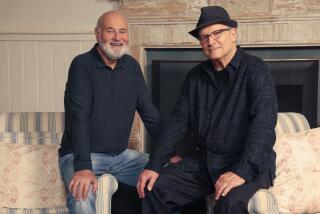‘Louise Brooks’ Looks Back at Brief, Brilliant Career
- Share via
No actress made fewer starring movies yet attained so major a place in film history as Louise Brooks. And as narrator Shirley MacLaine remarks in the excellent “Louise Brooks: Looking for Lulu” (on Turner Classic Movies tonight), “Nobody burned more bridges than Louise Brooks.”
One of the most dazzlingly beautiful women ever to face a camera, Brooks, who died at 78 in 1985, was like a phoenix, rising from the ashes of a career she threw away in her mid-20s to emerge as a timeless icon--largely on the basis of one great picture, G.W. Pabst’s 1928 silent “Pandora’s Box.” In that incandescent film, Brooks was innocent sexuality incarnate.
A small-town Kansas girl who grew up in Wichita, the daughter of a progressive mother and a nice, “fuddy-duddy” father--to borrow his daughter-in-law’s affectionate description--Brooks was an aspiring dancer whose life was transformed when the fabled Denishawn modern dance troupe came to town. Soon she was making her mark in the company, only to be dismissed for displaying a “superior attitude.” While still in her teens she was already setting a lifelong pattern.
Broadway revues beckoned, and by 1925 so had Hollywood. Brooks was going places at Paramount, only to take off for Berlin for her remarkable collaboration with Pabst, which was continued with the similar and impressive “Diary of a Lost Girl” and then the French film “Prix de Beaute.”
Before long her Hollywood career was wrecked, reduced to bit parts until it ran out by the late ‘30s.
Well-directed by Hugh Munro Neely, this one-hour documentary was written by Brooks’ distinguished biographer Barry Paris.
Of all the perceptive observations made by her friends, that of composer David Diamond is the one that lingers: “She was so strong she annihilated herself.”
* “Louise Brooks: Looking for Lulu” appears at 5 p.m. today on cable’s Turner Classic Movies channel, followed at 6 p.m. by “Pandora’s Box.” “Looking for Lulu” will be repeated at 8 p.m., followed by Brooks’ “The Show Off” (1926) at 9 p.m. and “God’s Gift to Women” (1935) at 10:30 p.m.
More to Read
Only good movies
Get the Indie Focus newsletter, Mark Olsen's weekly guide to the world of cinema.
You may occasionally receive promotional content from the Los Angeles Times.










